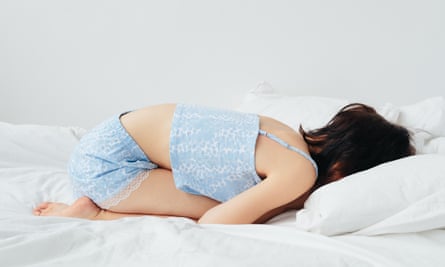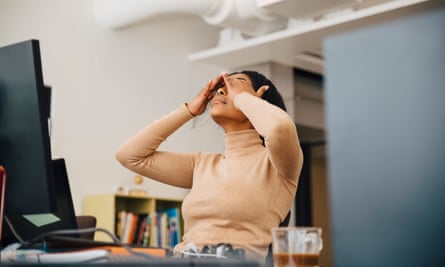[ad_1]
“Too graphic.” “Unnecessary.” “Degrading.” These were just some of the words littered among the 798 complaints received by the Advertising Standards Authority (ASA) in 2022 for the #periodsomnia advert from the intimate hygiene brand Bodyform.
The perceived issue? It depicted period blood on the sheets. But who’s going to tell these grumblers that this is *whispers* … normal? And actually, some people’s periods are a lot harder going.
Periods come in all shapes and sizes. Some tick over as reliably as an old, faithful clock, while others are more sporadic. Some stretch on, while others are over in a flash. Some are heavy and arduous, others are light and effortless. Some cause great pain, others go almost as unnoticed as breathing.
With such stigma continuing to surround periods, it can be hard to know how to navigate having more troublesome cycles. Difficult periods – such as heavy bleeding (also known as menorrhagia), painful periods caused by the likes of endometriosis, or irregular cycles – are perhaps more common than you think. Up to 25% of women experience at least one episode of heavy bleeding during their reproductive age, while one in 10 have endometriosis – a condition where cells that are usually found inside the uterus grow in other locations. Between 14% to 25% of women have irregular menstrual cycles. So why, when so many of us experience these phenomena, is there an expectation to suffer in silence?
“There is still a persistent and pervasive stigma around periods, despite them being an entirely normal and vital bodily function,” says Rachel Grocott, CEO at Bloody Good Period, a charity fighting for menstrual equity. “We’ve been collectively conditioned – by generations of ‘polite conversation’ and euphemisms – that menstruation is best ignored and preferably not spoken about.” This, Grocott points out, is a demonstration of patriarchy. “It’s a way of saying that the needs of women and people who menstruate don’t matter to society.”

Difficult periods can be inconvenient at best; or worse, debilitating. A “heavy period” is defined by the NHS as a need to change your pad or tampon every one to two hours, or a need to use two types of period products together – not exactly conducive to carrying out carefree everyday activities. It’s not uncommon for such periods to last more than seven days, and for people to bleed through their clothes and bedding, often rendering them distractingly concerned about the “embarrassment” of a potential mishap. But would we feel the same way about a nosebleed? It’s unlikely.
The crux of the issue is the ingrained belief that menstruation is distasteful. Unsanitary, even. Not something to be spoken about in public. As a result, there’s embarrassment attached to the idea of leakages – which is a very real possibility with a heavy period. “We believe that straightforward period talk – like calling pads and tampons ‘period products’ – helps to break down shame,” says Grocott. At Bloody Good Period, use of descriptors such as “sanitary” or “hygiene” have been banned in order to help dismantle the implication that periods are unsanitary or unhygienic. Perhaps we should all be doing the same in our everyday conversations.
Just as period blood is deemed gruesome, women’s pain (or pain experienced by anyone with a female reproductive system) is assumed to be something we must simply get on with. “A large part of the taboo of periods is linked to the myths and lack of education around them. For example, how they are often seen as something people should just deal with,” says Sarah Priestley Turner, spokesperson for Freedom4Girls, a charity working to challenge the stigmas and gender inequalities associated with menstruation. According to a recent survey by Essity – a global hygiene and health company with leading period and intimate care brands such as Bodyform and Modibodi, incontinence brand TENA and compression therapy brand JOBST – only 55% of the population feel they’re knowledgeable about menstruation, while 59% of men believe that nothing can be done about period related suffering.

Essity’s film, Studio Taboo, spoke to a number of people with a variety of health issues that are still deemed taboo, many of which are invisible. The above clip features Greta explaining how menorrhagia affects her.
This assumption that periods equal pain doesn’t just dismiss women’s suffering, it has real consequences for reproductive health. Endometriosis has an average diagnosis time of eight years. That’s despite the fact that 176 million people are affected by it worldwide, and painful flare-ups (usually occurring monthly) can cause severe scarring and adhesions. This delay in diagnosis, Grocott says, is “at least partly because period pain is all too often dismissed as ‘normal’ and ‘all part of being a woman’ by many doctors”. What’s more, if we’re all taught to accept that having female reproductive organs means we should learn to live with pain, how will we know when that pain extends beyond what’s actually normal, and what’s, instead, a serious health condition?
Part of dealing with difficult periods is navigating the tough conversations that come with them – for example, in the workplace. Or, as more often happens in reality, avoiding those conversations and suffering to save face. “We’d encourage everyone to be open and honest about their periods and their needs, but we also know that this simply isn’t possible for many people,” says Grocott. “We’ve heard from employees who faked food poisoning, as that’s more acceptable to talk about in the office than period cramps. Our research has shown that 89% of women and people who menstruate have been stressed or anxious at work because of their period.”

For some, anxiety around periods goes beyond the pain, with period poverty being a very real issue in the UK, where one in 10 girls can’t afford to buy menstrual products. This lack of access has profound, real-world consequences, with research by Plan International UK finding that 49% of girls have missed an entire day of school because of their period, and over the course of a year 137,700 children miss school because of period poverty. In response, Essity has donated 1.2m Bodyform products every year since 2017 to UK charities. But the work is far from done.
The only realistic way to move forward is to dismantle the culture that enables this secrecy and stress to thrive. But how do we do that? Pushing on with normalising conversations about periods, and empowering people to educate themselves about their own – and others’ – bodies so they have the right language to talk is a great place to start. Initiatives such as Bodyform’s #Painstories are a vital step towards this, while major brands giving menstruation the spotlight (for example, Puma’s recent collaboration with period pants brand Modibodi) helps it to enter the “mainstream”. The more we see this on a public stage, the more we start to undo the shame and silence that stands in the way of getting the help we deserve.
“There’s nothing more empowering than getting past the stigma and talking to others, especially if you face any additional challenges such as heavy or painful periods,” says Turner. “There should be no shame in having a period, and certainly not in needing menstrual healthcare, products, advice, support, and in having experiences heard and recognised,” says Gricott.
Let’s have the conversations we’ve been conditioned to avoid. Tell your coworkers when your period pain is intercepting your ability to think. Share with your friends when another overnight leak meant changing the bedsheets again. Gently correct people when they use derogatory words to describe menstruation. Small exchanges could have powerful consequences.
Find out more about leak-free period underwear from Modibodi
[ad_2]
Source link
